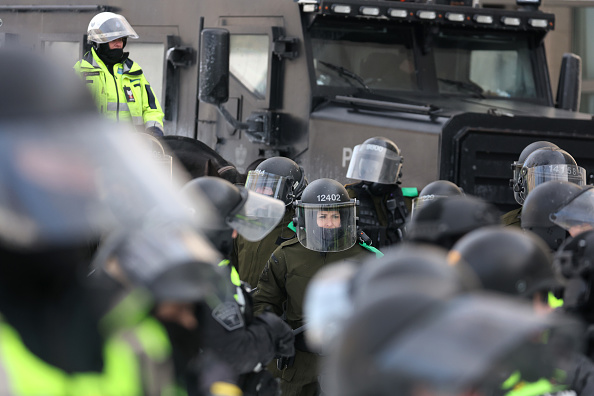
Armed police officer deploy to remove demonstrators against Covid-19 mandates in Ottawa on February 18, 2022. (Photo by Scott Olson/Getty Images)
In Canada, the checks and balances that restrain government overreach are being ignored
By Paul Groarke
Commentary
The federal government proclaimed a national state of emergency and invoked the Emergencies Act on Feb. 14 of this year. We are now dealing with the aftermath. There are demands that the minister of public safety resign for misleading the House of Commons.
I will only mention one of the worst abuses, which was that the government gave itself the power to freeze the bank accounts of people who supported the protests, without a judicial order. Like so much of what happened during the COVID crisis, it taught us that the people running the country do not have the slightest grasp of the fundamentals of constitutional government.
The current view seems to be that the people in political office have the authority to do whatever they want, simply because they were elected.
That is not how the system works. The history of government has taught us that the actions of the people in power need to be constantly scrutinized to keep them within proper limits. As a result, we have a host of checks and balances, which are there to prevent them from doing whatever they see fit.
There is a reason why the Magna Carta is the cornerstone of the system. It stands for the principle that the law of the land takes precedence over the powers of government. The law of the land is now the constitutional law, which is supreme, and places legal limits on the power of the government to restrict our freedoms.
That is the principle, at least, which worked rather well until recently, when a new generation of politicians, judges, and public officials apparently decided that politics trumps law and the government has the right to do what it wants. The invocation of the Emergencies Act will go down as a historical embarrassment, which merely demonstrated that the politicians do not know their limits and will go to any lengths to get their way.
The excuse all the way through the crisis has been that we are in an emergency. It was hyperbole, of course, and political fiction. The threat to our national security was largely imaginary. Try telling someone in Sudan or Ukraine that the sound of honking horns on Wellington Street imperilled the country.
A lot of middle-class indignation in Ottawa during the days of the “Freedom Convoy” was instigated by local politicians, since we were heading into a municipal election and they did not want anyone upsetting the public. The removal of the police chief at the height of the misconduct deserves an inquiry of its own.
It seems to me that Mr. Trudeau mostly went into hiding. He has his autocratic side, and he simply didn’t want the protesters there. The failure of his government to listen to the cries of frustration from ordinary Canadians was nothing short of mystifying.
The point is that the invocation of the Emergencies Act was not a genuine response to the facts on the ground. If you watched the hearings on the implementation of the Emergency Act last week, it was clear from the slipshod responses that the people on Mr. Trudeau’s side know it wasn’t justified and don’t really care. They were going to bend the facts and do whatever they had to do to get the boss the result that he wanted. Now they are going to rationalize it all away. It seems to me that their capacity for self-deception is endless.
In its application to the Federal Court, the Civil Liberties Association described the invocation of the Emergencies Act as “unnecessary, unjustifiable and unconstitutional.” I think we can go much further. It seems to me that Mr. Trudeau’s use of the emergency powers was blatantly unconstitutional.
So where was the privy council and the civil service? Why did just about everyone in the upper echelons simply go along? The courts should have stepped in; the police should have balked; and where was the mainstream press, which should have hammered the government?
They all should have been applying the brakes.
There are deep issues here. It seems to me that the political climate in Ottawa has become remarkably permissive. The traditional checks and balances on government are still there, on paper, but it is clear that they mean very little when the people applying them are all playing politics.
The real crisis is a crisis of character. We need a different set of people in positions of authority, who refuse to give in to political pressure. We need judges and officials who provide calm and dispassionate oversight and place the proper limits on the prime minister and his cabinet.
I do not know where we will find those people, but without them it is evident that those currently in charge are going to continue to run roughshod over the liberties of the public. And get away with it.
Views expressed in this article are the opinions of the author and do not necessarily reflect the views of NTD Canada.